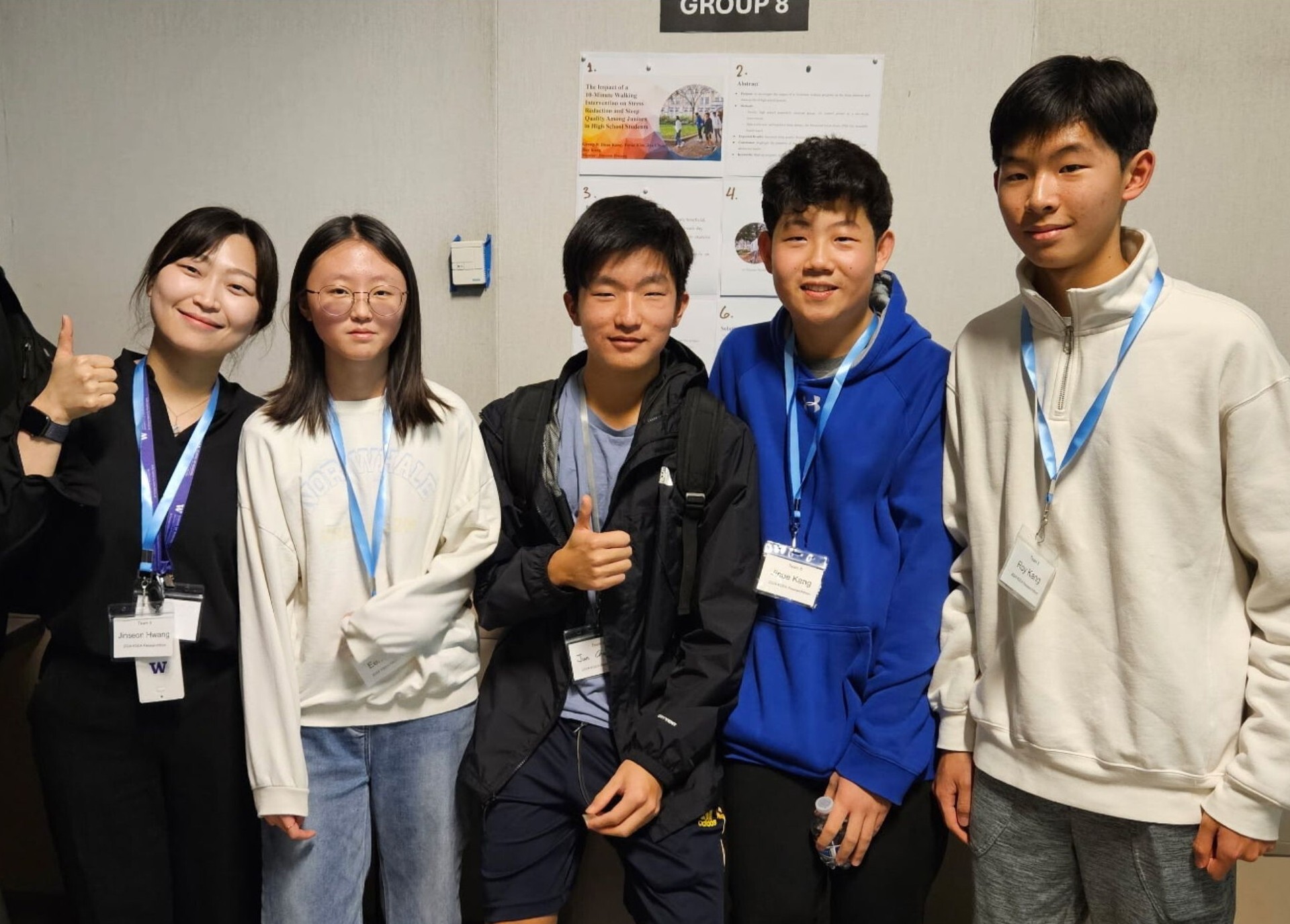Bellevue Teens Step Up to Study Sleep & Stress

Fromleft: Jinseon Hwang (Mentor), Eerae Kim, Jun Choi, Jinue Kang, and Roy Kang
Jinue Kang, Jun Choi, and Roy Kang are 9th graders at Bellevue High School, working on a research project with another student, Eerae, from another school. Jinue introduces himself as “a person who loves to socialize, play tennis with friends, and play piano when he is not working on schoolwork.” At the beginning of this year, Jinue and the other three students gathered together for the Researchthon event hosted by the Korean-American Scientists and Engineers Association (KSEA) at the University of Washington. There, students were paired up with mentors to learn about research and propose a draft of a research paper over two days.
On the first day of the event, Jinue and his team brainstormed to come up with a research topic that would hopefully benefit their peers and community. Jinue shares, “My 8th grade year was really difficult, and I could spend no time outside because of heavy workloads from school.” He recalls being stressed out and still having to stay up late at night to finish homework. Seeing his brother and his high school friends being unable to get quality sleep studying for the SAT and AP exams, he realized it was not just his problem. He points out the gravity of the issue of high school students struggling with sleep due to stress, noting that their performance in school deteriorates with no time to recollect themselves. As a result, his team decided to investigate the relationship between sleep and stress in high school students, and translated their idea into words for their draft with the help of their mentor. Their draft won 2nd place out of ten teams at the Researchthon. Jinue admits, “I was really stressed because I wanted my team to win, but was happy at the end to find out the result.”
He highlights that what made this result possible was not because his team was (super) prepared, but because they “did great as a team together.” His team is now preparing to present before scientists and professionals from all across the nation at the US-Korea Conference (UKC) in August. For this event, their research began by gathering ten high school students from their school who were willing to go for a 15-minute walk every day before bedtime and wear a watch that monitors their heart rate and sleep quality. They also asked the research participants to record their feelings about stress, where their stress originated from, and how they felt after getting sleep.
Jinue highlights one of the first challenges the team faced, saying, “At the beginning of the trial period, we lost three of the participants due to various reasons, such as having trouble sleeping with a watch.” However, instead of being discouraged by the change, his team learned a lesson: “In the real world, there will always be other factors that come into play that we have never even considered.” With this mindset, his team continued with seven participants for two weeks. His team reminded the participants through texts and at school each day to ensure they were taking a walk each night, keeping their journals, and following the procedures given. Having gathered data from participants, his team is now crafting a script and posters to present at the UKC.
Although his team is currently in the process of preparing their research this summer, Jinue and his team highlight a lesson they learned while carrying on their research. They share, “Students are the key to our society. If we see them struggling and we can do something that might help, we have to try and see if it works.” They hope their research will benefit students in their community and also advise anyone, not just students, to “go outside, clear your mind, take your mind off things, and come back.”
Last but not least, he acknowledges their mentor, Jinseon Hwang, a PhD nursing student at the University of Washington, who dedicated her time to Jinue and his team, facilitating research and drafting a research paper, all while conducting research trials while working on her own research.